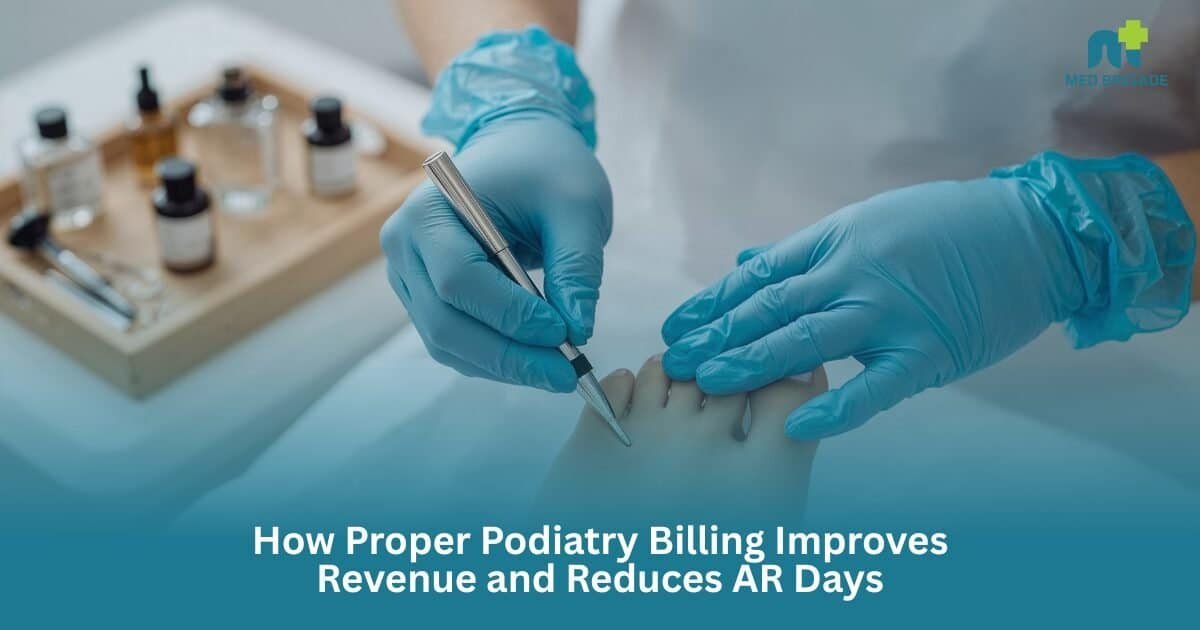
How to recover denial or lost revenue by clinics and hospitals from insurance companies
A rejected insurance bill is not merely a lost payment-regardless of whether one is a small clinic or a big hospital, it is a lost opportunity to keep the cash flow, compliance liabilities as well as an administrative burden. Clinics and hospitals will be able to recover denied claims effectively with the right denial management strategies and insurance recovery processes.
Sign up for our blogs
Latest Post


A Complete Guide to Medicare & Podiatry Reimbursement

How to Avoid Chiropractic Billing Errors That Cost You Money

Internal Medicine Coding Accuracy: Key to Maximum Reimbursement

How Proper Podiatry Billing Improves Revenue and Reduces AR Days

How Radiology Practices Can Improve Revenue Cycle Efficiency
Billing Enquiries

Realizing the Implications of Non-Admitted Claims
Rejected claims are not merely a figure on a statement, but they constitute much loss of money. According to the industry statistics, about 10 percent of all medical claims are refused at the initial submission, and some providers simply leave without coming back on appeals because of some time costs or insufficient qualified personnel. It is unpaid reimburse drawings that in thousands are missed every year by these wasted opportunities.
Managing the denial in medical billing begins with the development of an understanding of the underlying causes of the claim denials. The widespread problems involve something to do with coding, incomplete documentation, eligibility error, or that the filing deadline has been missed. Determining these trends will be the initial step in developing a proactive agenda that will not provide denials in the future and will aid in making hospital revenue recovery strategies.
Step 1: Establish a Firm Denial Management Facilities
A good denial management process is the key to revenue recovery in the healthcare industry. Clinics and hospitals should have specific teams or partners who would monitor, group, and analyze all of the denials to decide the cause and rate.
The automation tools can be used to identify the high-risk claims and give priority to those that are to be addressed urgently. In addition to accelerating the resolution, accurateness is also enhanced. An analytical method ensures that trends are realized early on that gives healthcare organizations the ability to take corrective measures before it is too late to realize hold up of denial.
Step 2: Conduct Root Cause Analysis
Each claim that is denied narrates something. A root cause analysis would assist in understanding how claims are getting rejected every time. This could either be because of the difference in coding, payer policy adjustments or poor documentation.
After outlining the issues that have shown to be recurring, revise your billing procedures. Developing staff training about insurance claim recovery for hospitals and educating them about the payer-specific regulations can be an effective way to reduce rejections. During this phase, reactive claim resubmission no longer gets attention but rather preventive improvement of processes.
Step 3: Optimize the process of communication with Payers
Resorting to proactive communication with insurance firms is a way of recovering the revenue that is lost or denied. Problem solving can be done by establishing special channels of communication and creating relationships with the representatives of payers in order to solve the problem faster.
Once the claims are rejected appeal in time with all supporting paperwork and be able to explain the reasons. Follow-ups should be done in a timely manner because timely following up may save or lead to a pain or recording of the money as bad debt. It is also necessary to keep track of the interactions with the payers in order to facilitate the audit or disputes.
Step 4: Deploy Technology to Your Benefit
Technology is extremely critical in the field of modern denial management in medical billing. Automate re-submissions, identify trends and anomalies using advanced billing systems that are wired with AI and analytics. Indicatively, software validation of claims prior to submission would mitigate rejection of claims-based on missing information or erroneously incorrect codes.
Furthermore, predicting the probability of denials and proposing preventive actions using the tools of AI-based revenue recovery integration can transform reactive recovery into proactive protection.
Step 5: Recruit an Experts in Revenue Recovery
In other cases, the best method to salvage rejected claims is cooperating with those experts that specialise in recoverable lost revenue recovery in healthcare. Simply outsourcing the process to professional billing partners will result in a significant increase in collection and decreased turnaround time.
Some companies such as Med Brigade offer full denial management and hospital recovery of revenue strategies, which allows clinics and hospitals to receive the highest percentage of reimbursement with minimal effort on the part of the internal personnel. Having strong knowledge in terms of payer communication, appeals and compliance, these partners will make matters efficient in terms of getting done and collecting each and every dollar owed.
Step 6 Continuous Training and monitoring
Denial management does not require any one-time effort, but a continuous process. Urgent training of the staff, reviewing of processes, and adherence to their maintenance is necessary to guarantee any improvement. Inform your staff of the payer policies, coding changes and billing policies.
Adopting the use of dashboards and reports to track the trends in denials will enable the leadership to make decisions and then allocate resources in a strategic manner. This develops through time, a sustainable paradigm of insurance claim recovery by hospitals and would guarantee a stable flow of revenue.
Partner with Med Brigade to Get Best Services
Do not allow low modulations and revenue failure to drag your healthcare establishment backwards. Contact Med Brigade and have professionals handle any form of denial management and recovery of revenue in healthcare. Our full-time billing experts comply with the most effective practices and the latest technologies to assist in ensuring that you are getting much more money quickly. Call us to earn the revenue your clinic or hospital is entitled to.
Denied or lost revenue does not just get recovered automatically but through organized approach, follow-up and qualified assistance. In the case of healthcare organizations each of the claims reflects care provided and money expended; it is of significance to be able to receive reimbursement by the time financial stability is achieved.
Through the use of modern tools, optimizing internal procedures and encouraging other professionals such as Med Brigade, clinics and hospitals are able to turn the issue of denials into a winning model of revenue recovery. It is not merely recovery but rather to establish a better and effective billing base in the future.
FAQS
Through pre-billing audit, training of staff and automated claim validators that identify errors at the at the onset.
Admittedly, outsourcing will allow healthcare facilities to get professional resources and tested methods of recovery, which allows not only to increase the quality of reimbursements and decrease staff workload.
Yes. The same level of support can be offered by virtual scribers remotely employing telehealth systems that can be secure. They are very affordable and adjustable, particularly in the provision of telemedicine in practices.